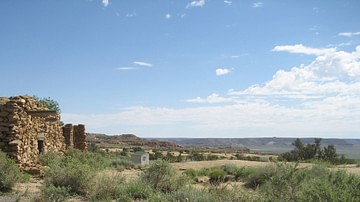Search
Search Results

Article
Boethius: First of the Medievals?
Anicius Manlius Severinus Boethius (c. 477-524/525) was a scholar in Late Antiquity who was imprisoned and executed by Theodoric (r. 493-526 CE) but was later idolised by medieval intellectuals. His most famous work was De consolatione philosophiae...

Definition
Hellenic World
The Hellenic World' is a term which refers to that period of ancient Greek history between 507 BCE (the date of the first democracy in Athens) and 323 BCE (the death of Alexander the Great). This period is also referred to as the age of...

Definition
Pequot War
The Pequot War (1636-1638) was a conflict between the Native American Pequot tribe and the English immigrants who had established settlements in New England between 1620-1630. The immediate cause of the war was the murder of two English traders...

Article
How the Hopi Indians Reached Their World
How the Hopi Indians Reached Their World is the creation story of the Native American Hopi nation (the Hopi tribe of Arizona) located today within the Navajo Nation reservation. The legend details the ascent of the Hopi from below the earth...

Definition
Third Punic War
The Third Punic War was fought between Carthage and Rome between 149 and 146 BCE. Carthage had already lost two wars against Rome, but their assault on their Numidian neighbours gave the Romans the perfect excuse to crush this troublesome...

Definition
Social War
The Social War (also called the Marsi War or the War of the Allies) of 91-87 BCE was the result of decades of contention between Rome and its Italian allies. Roman warfare relied heavily on the Italian allies (socii), but the Roman Republic...

Article
Cultural Links between India & the Greco-Roman World
Cyrus the Great (558-530 BCE) built the first universal empire, stretching from Greece to the Indus River. This was the famous Achaemenid Empire of Persia. An inscription at Naqsh-i-Rustam, the tomb of his able successor Darius I (521-486...

Definition
The Art of War
The Art of War (Sunzi bingfa) is a 5th-century BCE military treatise written by the Chinese strategist Sun-Tzu (aka Sunzi or Sun Wu). Covering all aspects of warfare, it seeks to advise commanders on how to prepare, mobilise, attack, defend...

Video
World War II: Crash Course World History #38
In which John Green teaches you about World War II, aka The Great Patriotic War, aka The Big One. So how did this war happen? And what does it mean? We've all learned the facts about World War II many times over, thanks to repeated classroom...

Article
First Battle of Newbury
The First Battle of Newbury on 20 September 1643 was a major engagement between Royalist and Parliamentarian armies during the English Civil Wars (1642-1651). The Royalist forces loyal to Charles I of England (r. 1625-1649) were led by Prince...